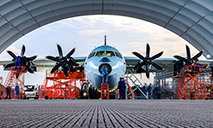Commentary: How to put Iran nuclear deal back on track?
TEHRAN, Dec. 30 (Xinhua) -- With talks on the revival of the Iran nuclear deal entering the eighth round, the political and diplomatic resolution of the Iranian nuclear issue now faces fresh opportunities as well as daunting challenges.
The landmark deal was reached in 2015 after years of relentless multilateral diplomacy. Yet the previous U.S. administration threw it away without hesitation, and slapped "maximum pressure" sanctions against Tehran in the belief that its big stick strategy was a better option.
This hardline gambit has not only failed, but also further complicated the situation. Even U.S. Secretary of State Antony Blinken described it as "one of the worst decisions made in American foreign policy in the last decade."
The new sanctions prompted Iran to begin reviving its nuclear program in 2019. Now the Middle East country is able to enrich small amounts of uranium up to 60 percent in purity.
It is a broad international consensus that a viable Iran nuclear deal is important for promoting nuclear non-proliferation as well as peace and stability in the region and around the world.
To resurrect this hard-won accord, seven rounds of negotiations have been held. For the ongoing round to be more productive, one of the fundamental principles is to make sure that all related sides play their due role.
The United States is responsible for triggering the crisis, thus it should first lift illegal and unilateral sanctions against Iran and third parties. On this basis, Iran should deliver its promise by resuming full implementation of the nuclear deal.
For other relevant sides, they, by upholding the spirit of justice and fairness, need to jointly create suitable conditions so that Washington and Tehran can do their fair share.
Another key factor to the success of the negotiations is to respect the legitimate rights, interests and concerns of various sides, notably the rights and interests of the related sides in conducting normal economic and trade cooperation with Iran.
Pragmatism and flexibility are also needed at the negotiating table.
On a positive note, Enrique Mora, the European Union's coordinator in the meeting, said on Monday that diplomats in Vienna "have incorporated sensitivities of a new Iranian government." Iranian Foreign Minister Hossein Amir Abdollahian said on Tuesday that different sides now "have a unified and joint text" to guide future negotiations.
In the future talks, all the delegations, based on what they have achieved so far, should continue to draw on political wisdom, creatively resolve outstanding issues and strive to reach more consensus.
Most fundamentally, all sides should keep to the direction of solving the nuclear issue with political and diplomatic means.
Instead of showing goodwill, the current White House has imposed fresh sanctions on more Iranian government agencies and officials while the nuclear talks are underway in Vienna. Washington has also repeatedly threatened an "escalating crisis" or other options if diplomacy failed.
Such a bullying attitude only helps justify Iran's reluctance to enter into direct negotiations with the U.S. side as well as the country's doubts over Washington's real intentions.
Now that the talks are underway, China will as always continue working with others on the basis of equality, mutual respect and mutual benefits so that the nuclear pact can be brought back on track at an early date.
Photos
Related Stories
- China calls for expanding consensus, properly handling differences in Iran nuclear talks
- Iran launches large-scale war game along southern coasts: state TV
- Iran's president says "good agreement" reachable in nuke talks
- China, Iran jointly issue stamps of bridges to mark golden jubilee of diplomatic ties
- Iran says presents draft proposals on sanctions removal, nuke restrictions at Vienna talks
Copyright © 2021 People's Daily Online. All Rights Reserved.










